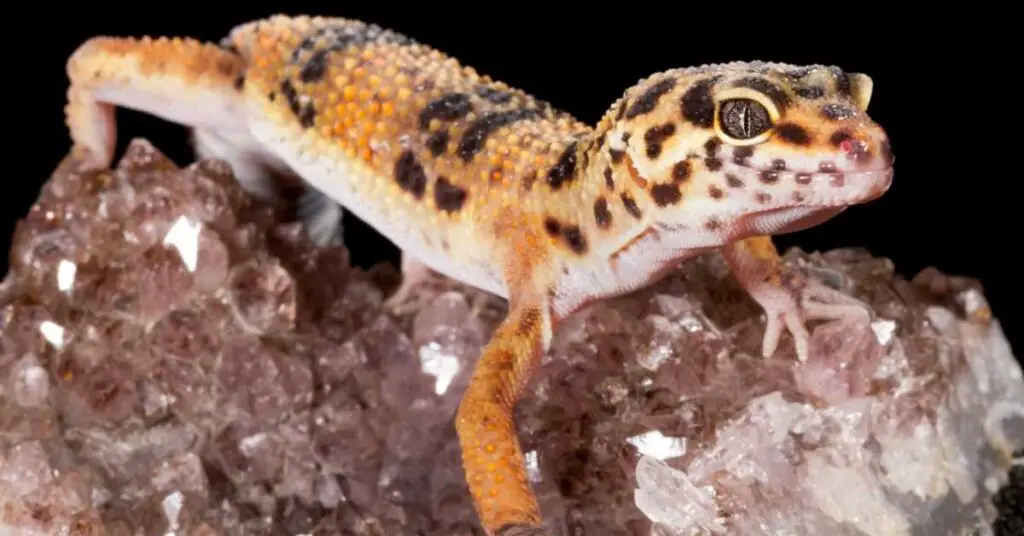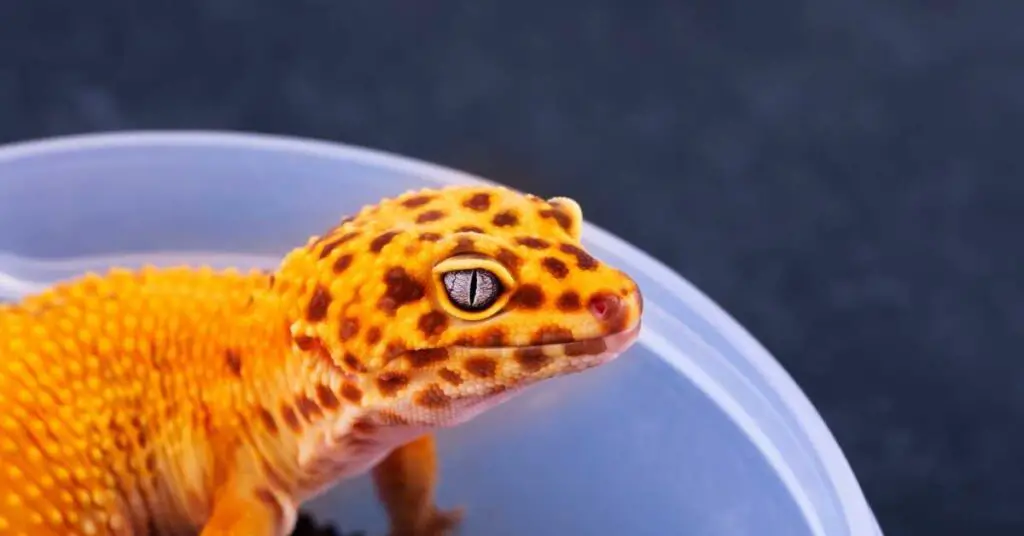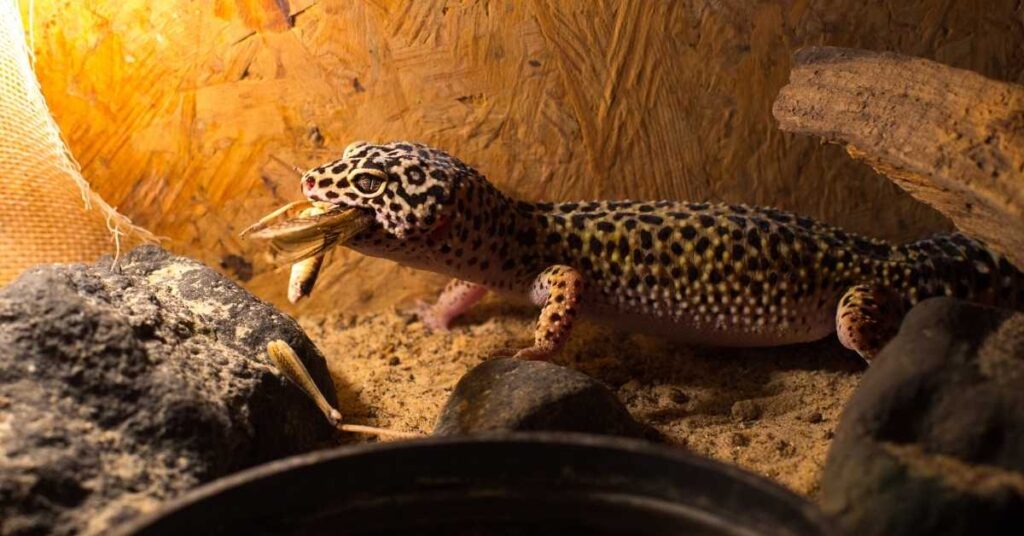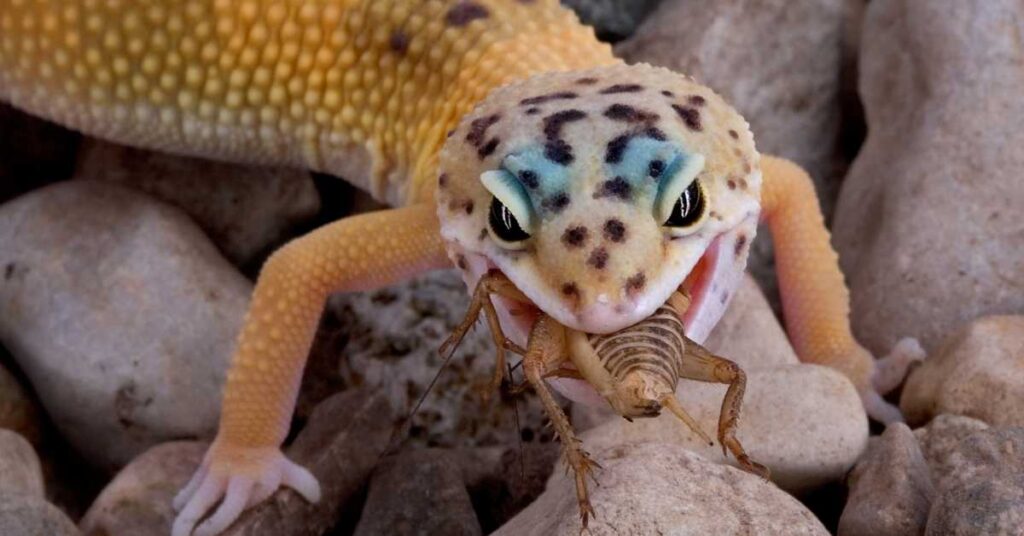We’re an affiliate. We may earn a commission on qualifying purchases through the links on this page. Learn more by reading our disclaimer.
Are Leopard Geckos Omnivores?
Are leopard geckos omnivores? No, leopard geckos are not omnivores. They are insectivores and primarily eat insects in the wild. However, they will consume other small animals if given the opportunity. A captive diet usually consists of crickets, mealworms, and other appropriately sized insects. Some people like to feed their leopard geckos pinkie mice or waxworms as a treat, but these should not be given too often as they can cause digestive issues.
Leopard geckos are one of the most popular pet lizards. They are easy to care for and are generally considered to be very docile creatures. But are leopard geckos omnivores? What do they eat in the wild?
In this blog post, we will explore the diet of leopard geckos and answer the question once and for all: are leopard geckos omnivores?

Are Leopard Geckos Omnivores, Carnivores or Insectivores?
Leopard geckos are not omnivores or carnivores. Leopard geckos are insectivores which means that they eat primarily insects such as mealworms, crickets, dubia roaches, and other small insects. In the wild, they will also eat other small animals if given the opportunity but this is not a large part of their diet.
A captive diet usually consists of crickets, mealworms, and other appropriately sized insects. Some people like to feed their leopard geckos pinkie mice or waxworms as a treat, but these should not be given too often as they can cause digestive issues.
A wide variety of feeder insects are available at local pet shops or online which makes feeding leopard geckos pretty easy. Combine that with their docile nature and you have a great pet for first-time reptile owners and experienced reptile keepers alike.
What Is the Proper Diet for A Leopard Gecko?
The proper diet for a leopard gecko is gut-loaded (live) insects dusted with calcium powder. Crickets, Dubia roaches, and mealworms are all good choices. The insects should be about the same size as the space between the leopard gecko’s eyes.
A healthy diet will help your leopard gecko to grow and stay in good condition. A lack of proper nutrition can lead to a number of health problems including metabolic bone disease, respiratory infections, and digestive issues.
Can You Feed Your Leopard Gecko Wild Insects?
No, you shouldn’t feed your leopard gecko insects that you catch outside. Wild insects can carry parasites and diseases which can make your leopard gecko very sick. It is best to stick to commercially raised insects that are available at your local pet store or online.
Can You Feed Your Leopard Gecko Vegetables and Fruit?
Although some leopard gecko keepers do prefer to give them some fruits and vegetables, it is not recommended as the main part of their diet. Leopard geckos are not able to digest plant matter very well and it can cause digestive issues.
If you do decide to feed your leopard gecko fruits or vegetables, you do so at your own risk as a leopard gecko’s body is not made to digest these foods.
What Does a Leopard Gecko Eat?
Leopard geckos are insectivores which means that they eat primarily insects. In the wild, their diet consists of crickets, mealworms, and other small insects. A captive diet usually consists of crickets, mealworms, and other appropriately sized insects.
Some people like to feed their leopard geckos pinkie mice or waxworms as a treat, but these should not be given too often as they can cause digestive issues.

How Long Can a Leopard Gecko Go without Eating?
A healthy leopard gecko can usually go for about two weeks without food, but this is not something that should be done on purpose. If you are going to be away for more than a week, it is best to find someone who can come and feed your leopard gecko for you.
If for some reason you cannot find anyone to come and feed your geckos for you then rest assured that your leopard gecko will be fine for about a week without food.
This amazing feat is possible because leopard geckos are able to store fat in their tails. When food is scarce, the leopard gecko can draw on this stored energy to stay alive. However, this adaptation comes with a downside.
If a leopard gecko doesn’t eat for too long, it will start to lose weight and its tail will shrink. As a result, it’s important for leopard geckos to eat regularly so that they can maintain their health and energy levels.
What can I feed my leopard gecko when I am on vacation?
If you are going on vacation and need to find a way to feed your leopard gecko while you are gone, you have a couple of options. The first is that you find someone that can come and feed your leo while you are gone.
Feeding them is pretty easy and even a complete novice or someone who doesn’t have any experience can feed them with some simple instructions. This makes it easy to ask pretty much anyone in this situation.
The other alternative is to leave your leopard gecko with some food in its enclosure while you are gone. Please understand that you cannot leave live insects in your leo’s tank while you are gone as crickets will feed on your gecko while it sleeps.
The thing you can do is leave some freeze dried mealworms in your leo’s food dish while you are gone and that will provide some food for a few days after you leave without the same risk as live insects or worms.

What Can You Feed Leopard Geckos Besides Crickets?
In the wild, these lizards eat a variety of insects, but in captivity, they are typically fed a diet of crickets. While crickets are a good source of protein, they should not be the only food that leopard geckos eat. In addition to crickets, these lizards can also be fed mealworms, waxworms, and even different species of roaches.
Each of these foods provides different nutrients that are essential for leopard geckos to stay healthy. By providing a variety of foods, leopard gecko owners can ensure that their lizard gets the nutrition it needs to thrive.
Mealworms
Mealworms are a popular food choice for leopard geckos, and for good reason! They are an excellent source of protein and other nutrients, and they are also easy to digest.
In addition, mealworms are a great size for leopard geckos to eat, and they are relatively easy to find and purchase.
If you are looking for a nutritious food source for your leopard gecko, mealworms are a great option!
Superworms
There are a lot of reasons to love superworms! For one, they’re a great source of nutrition for your leopard gecko. They’re packed with protein and essential vitamins and minerals, making them a perfect addition to your leopard gecko’s diet.
Plus, they’re easy to digest and have a relatively soft exoskeleton, so they’re gentle on your leopard gecko’s stomach. Superworms are also a great size for leopard geckos – not too big and not too small.
And because they’re so nutritious, they help your leopard gecko grow and stay healthy. So if you’re looking for a great way to feed your leopard gecko, superworms are a great choice!
Waxworms
Waxworms are an especially good choice for leopard gecko food, as they are high in fat and protein and are easy to digest. In addition, waxworms are a good size for leopard geckos, and they are not known to carry any diseases that could harm your pet.
Waxworms are not good as a staple food item but rather a supplement to their balanced diet of gut-loaded insects because they are high in fat. You can give them waxworms once or twice a month without issues.
Hornworms
Hornworms are a popular food choice for leopard geckos, and for good reason! These plump, juicy caterpillars are an excellent source of protein and moisture, both of which are essential for your gecko’s health.
Hornworms are another food source that should be only given once or twice a month at most and in addition to your leo’s balanced diet of other gut-loaded insects.
Dubia Roaches
Dubia roaches are a type of tropical cockroach that is not known to carry diseases that could harm your leopard gecko. They are also high in protein and other nutrients, making them an excellent food source for your reptile.
Dubia roaches have a higher protein-to-shell ratio than crickets which makes them a better choice than pretty much any other feeder insect. You can also get them in practically any size which makes feeding geckos of all sizes easier.
Best of all, Dubia roaches can be easily ordered online and shipped right to your door. So if you’re looking for a healthy and convenient way to feed your leopard gecko.
Dubia roaches are hard to beat!
Can You Overfeed a Leopard Gecko?
Yes, and no. You can feed your leopard gecko too much of a particular food to the point that it is no longer healthy. For example, waxworms are a great food source but they are high in fat which means that they should only be an occasional treat because too much fat in their diet is bad for their health.
This aside, can you overfeed your leopard gecko in one meal? No, not really as leopard geckos will only eat as much as they want in one meal. That is why it is important to remove any crickets that your gecko doesn’t eat.

Are Other Types of Geckos and Lizards Omnivorous?
Yes, most other types of lizards are also omnivorous. This includes popular pets such as iguanas, bearded dragons, and tegus.
As a result, you can feed them a variety of different foods, including vegetables, fruits, insects, and even some meat.
Of course, each type of lizard has its own unique nutritional needs, so be sure to do your research before feeding your pet anything new.
But in general, most lizards are omnivores and will do just fine on a varied diet.
FAQs
Here are some commonly asked questions about what Leopard Geckos can eat:
Can Leopard Geckos Eat Human Food?
No, leopard geckos should not eat human food. They should eat insects only. Insects provide the perfect balance of nutrients for leopard geckos, while human food does not.
Feeding a leopard gecko anything other than insects can cause health problems. For example, feeding them fruit can give them diarrhea because of the high sugar content. And feeding them meat can cause liver problems because of the high levels of fat.
So it’s best to stick to insects and let your leopard gecko have a long and healthy life!
Can I Feed My Leopard Gecko Meat?
No, leopard geckos should not eat meat. They are insectivores, not carnivores.
Leopard geckos have a naturally high metabolism and need to eat a lot of insects to stay healthy. If they ate meat, their diet would be too high in fat and they would likely develop health problems.
Instead, give your leopard gecko a diet of insects such as crickets, mealworms, and wax worms. Make sure to dust the insects with a calcium/vitamin supplement to ensure your leopard gecko gets all the nutrients it needs.
Can Leopard Geckos Eat Scrambled Eggs?
No, leopard geckos should not eat scrambled eggs. While eggs are a nutritious food for humans and many other animals, they are not an ideal meal for leopard geckos.
Leopard geckos are insectivores, meaning that their diet should consist primarily of insects. Scrambled eggs do not contain the essential nutrients that a leopard gecko needs to stay healthy, so it is best to avoid them altogether.
Can Leopard Geckos Eat Ice Cream?
No, leopard geckos should not eat ice cream because it is not a part of their natural diet and it can be harmful to their health. Leopard geckos typically eat insects, such as crickets, mealworms, and waxworms.
Ice cream does not fit into this diet and can cause health problems for leopard geckos, such as obesity, diabetes, and organ failure.
Can Leopard Geckos Eat Lettuce?
No, leopard geckos shouldn’t eat lettuce. While they might be able to bite off a piece of lettuce and chew it, they can’t actually digest or process lettuce leaves.
Lettuce is too high in water content and fiber for leopard geckos, and it can cause digestive issues like diarrhea.
So even though a little nibble on some lettuce won’t kill your leopard gecko, it’s not advisable to feed them this vegetable on a regular basis.
If you’re looking for something to give your leopard gecko as a treat, try insects like waxworms or hornworms
In Conclusion
Leopard geckos make great pets, and with a little bit of knowledge about their diet, you can help keep your leo healthy and happy. Crickets, mealworms, and other appropriately sized insects should make up the bulk of your leopard gecko’s diet, but you can give them waxworm as a special treat every now and then.
Just follow the guidelines to what you should feed your leopard gecko that we have outlined here and you should have a happy and healthy leo on your hands.

